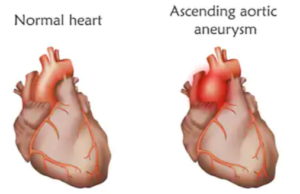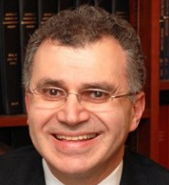Have you been experiencing a hoarse voice and chest pain?
If your chest pain and hoarse voice seem to be connected to each other, and even if they don’t seem related, this can indicate a potentially life-threatening situation.
“A hoarse voice by itself just indicates voice box (larynx) or vocal cord problems, like inflammation, infection, or polyps–as we see with celebrities like Julie Andrews or Adele,” says Dr. John A. Elefteriades, MD, William W.L. Glenn Professor of Surgery, and Director, Aortic Institute at Yale-New Haven, New Haven, CT.
“The additional symptom of chest pain puts this in a different category.
“The nerves that operate the vocal cords, called the ‘recurrent laryngeal nerves,’ run (curiously) into the chest and around the arch of the aorta before ascending back to innervate the vocal cords.”
The aorta, the body’s largest blood vessel, branches off the heart and supplies the body with blood.
Dr. Elefteriades continues, “So, a combination of chest pain and hoarseness makes one think of space-occupying lesions in the chest in the vicinity of the recurrent laryngeal nerves.
“Such lesions could include aneurysms and tumors and cancers.”
An aneurysm is an abnormally enlarged blood vessel, sometimes referred to as dilated or ballooned.
The ballooned or enlarged portion is very weak and prone to tearing or rupture; there is a direct correlation between size of aneurysm and likelihood of tearing or rupture.

Shutterstock/Veronika Zakharova
“These lesions cause chest pain by compressing adjacent structures and impinging on intra-thoracic (in-the-thorax) nerves,” continues Dr. Elefteriades.
“These lesions cause hoarseness by stretching the recurrent laryngeal nerves, thus disturbing their function. This disturbance may be transient or permanent.
“Sometimes, with removal of the offending mass, vocal cord function can return to normal.
“The symptoms must be attended to, as not only is the hoarseness troublesome in itself, but an aneurysm or tumor or growth can be very serious and life-threatening.”
If you have chest pain with a hoarse voice, seek immediate attention:
An aortic aneurysm can rupture without warning; half of all patients with a ruptured aortic aneurysm die before they reach the hospital.

Formerly the chief of cardiothoracic surgery at Yale University and Yale New-Haven Hospital, Dr. Elefteriades is working on identifying the genetic mutations responsible for thoracic aortic aneurysms. He is the author of over 400 scientific publications on a wide range of cardiac and thoracic topics.
 Lorra Garrick is a former personal trainer certified by the American Council on Exercise. At Bally Total Fitness she trained clients of all ages for fat loss, muscle building, fitness and improved health.
Lorra Garrick is a former personal trainer certified by the American Council on Exercise. At Bally Total Fitness she trained clients of all ages for fat loss, muscle building, fitness and improved health.










































